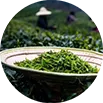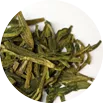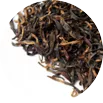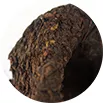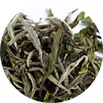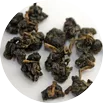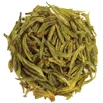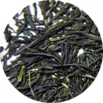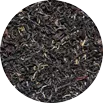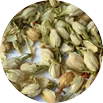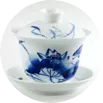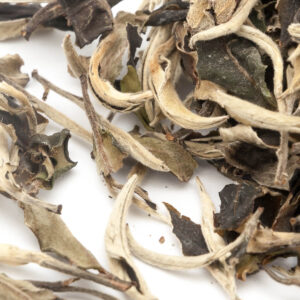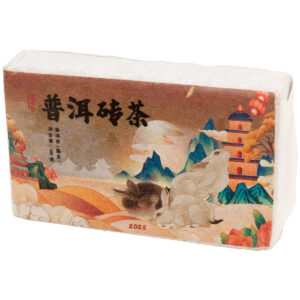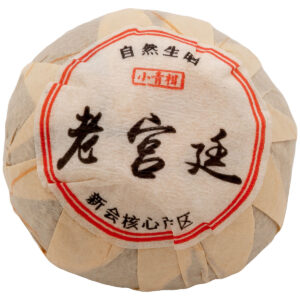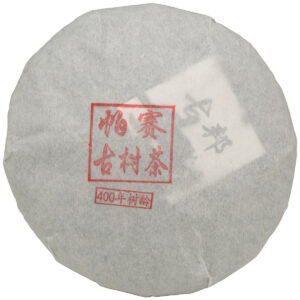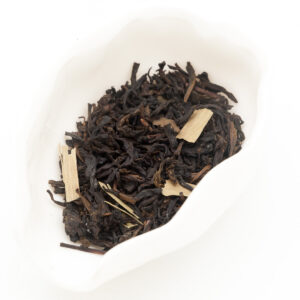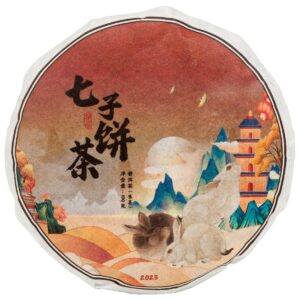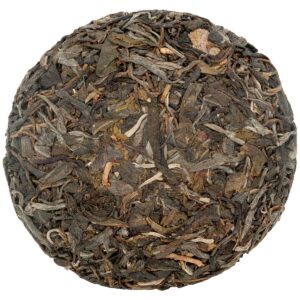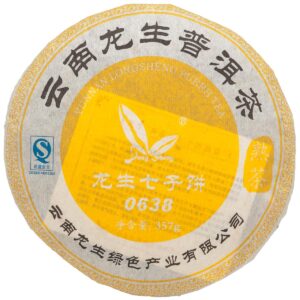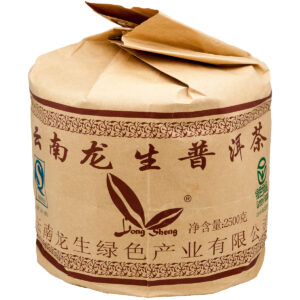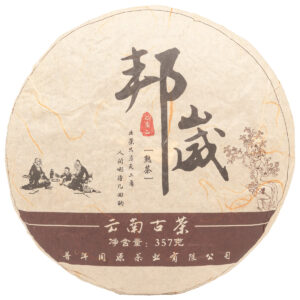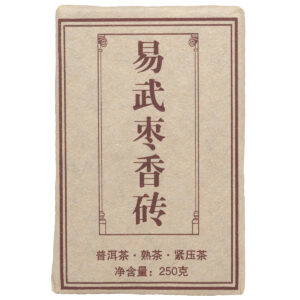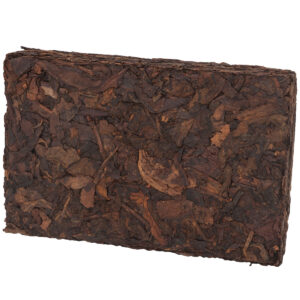Simao 2008 shu Gong Ting Xiao Bing Cha 150g
Wu Liang Shan 2012 sheng Gushu Tuocha 100g
Yi Wu Mahei 2015 Gushu sheng 200g
Yue Guang Bai “White Moonlight”
Xiao Qing Gan 2009 Xinhui
An Cha 2021
Long Sheng 2006 shu Bing Cha 357g
Bang Wai 2016 shu Bing Cha 357g
Pǔ’ěr chá / Pu`er Tea 普洱茶 (also spelled as Pu-erh, Puerh, P`u-er etc.) and Dark teas – 黑茶 (Hēi chá)
Pu`er tea, is a type of fermented tea that originates from Yunnan Province in South-Western China. It is named after the city of Pu’er (普洱市), which was a major trading center for tea during ancient times. Pu`er tea is made from the large-leaved variant of the Camellia sinensis plant (云南大叶). What sets this tea apart from other types of tea is its unique fermentation process. There are two types of Pu`er tea: raw / green Pu`er (sheng Pu`er 生普洱) and ripe Pu`er (shu Pu`er 熟普洱). Raw Pu`er tea undergoes a natural fermentation process over time, whereas ripe Puer tea undergoes an accelerated fermentation process through controlled microbial fermentation, called “wet pile” wodui渥堆. Pu`er tea is known for its earthy and woody flavour, with a rich and smooth taste. It is also highly appreciated for its health benefits, as described below. Pu`er tea is often stored for several years, with older teas being more expensive and highly sought after by collectors and tea enthusiasts.
Yunnan Da Ye 云南大叶, the big leaf tea is a variant of tea plant that grows predominantly in Yunnan province in South-Western China. Compared to other tea tree varieties, the Yunnan big leaf tea plant has several distinct features:
Leaf size: As the name implies, that Yunnan big leaf tea plant has larger leaves than other tea plants growing elsewhere. The leaves of the Yunnan big leaf tea plant can be 15-30 cm long.
Flavor: The Yunnan big leaf tea plant has a unique flavor profile, it tends to have a rich, earthy and/or woody flavor with hints of chocolate or malt.
Growing conditions: Yunnan big leaf tea plants are well-suited to the warm and humid climate of Yunnan province. They grow best at high altitudes (1200-1800 m), where the cooler temperatures slows down the growth of the tea leaves, resulting in a more complex flavor.
Health benefits:
Digestive health: Pu`er tea supports digestion by promoting the growth of beneficial gut bacteria, reducing inflammation in the gut, and regulating bowel movements.
Cardiovascular health: Pu`er tea has been linked to improved cardiovascular health by reducing blood pressure, cholesterol levels, and the risk of developing heart disease.
Weight management: Pu`er tea has a certain effect on weight control by supporting metabolism and fat burning, as well as absorption of dietary fat.
Anti-inflammatory effects: Pu`er tea contains compounds that have anti-inflammatory effects, which may help to reduce the risk of chronic diseases such as arthritis and diabetes.
Antioxidant properties: Pu`er tea contains high levels of antioxidants, which help to prevent the body from oxidative stress and free radical damage.
History:
Pu`er tea is a type of fermented tea that originates from the Yunnan province in South-Western China, where it has been consumed for centuries. Its history can be traced back to Tang 唐 dynasty (618-907), when tea cultivation in Yunnan province started.
During Ming 明 dynasty (1368-1644), pu`er tea became a popular commodity, and was traded along the famous “Tea And Horse Road” (in Chinese: cha ma gu dao 茶马古道), which was a network of trading routes connecting China with Himalayan regions resided by Tibetan-Burmese ethnics. This route was established to exchange tea (mostly pressed in cakes, brick, nests and other shapes) for horses. The tea was transported on people`s, mules`, yaks` and other animals backs. In 17th century, the production of pu`er tea was standardized by the tea merchants in the Yunnan province, who also developed a process for aging the tea to enhance specific flavor and aroma. This process involves allowing the tea leaves to ferment naturally over a period of several years.
In second half of 20th century, the production of pu`er tea underwent significant changes. In 1970s, the Chinese government began to invest in the tea industry, which led to the development of new production methods and techniques. One of the most significant changes was the introduction of a process called “wet piling”, in Chinese wo dui 渥堆 which involves fermenting the tea in large piles for several weeks and using heat and moisture to accelerate the aging process. The result is a dark, smooth and earthly tea.
In recent years, pu`er tea has also become increasingly popular in Western countries, as people have become more interested in its unique effects on human body, Pu`er tea is believed to have numerous health benefits , including improved digestion, cardiovascular health, and weight management.
Today, pu`er tea is still produced primarily in Yunnan Province, where it is revered as a traditional beverage and an important part of local culture. Pu`er tea is highly prized among tea enthusiasts and are considered to be among the finest and most unique teas in the world.


